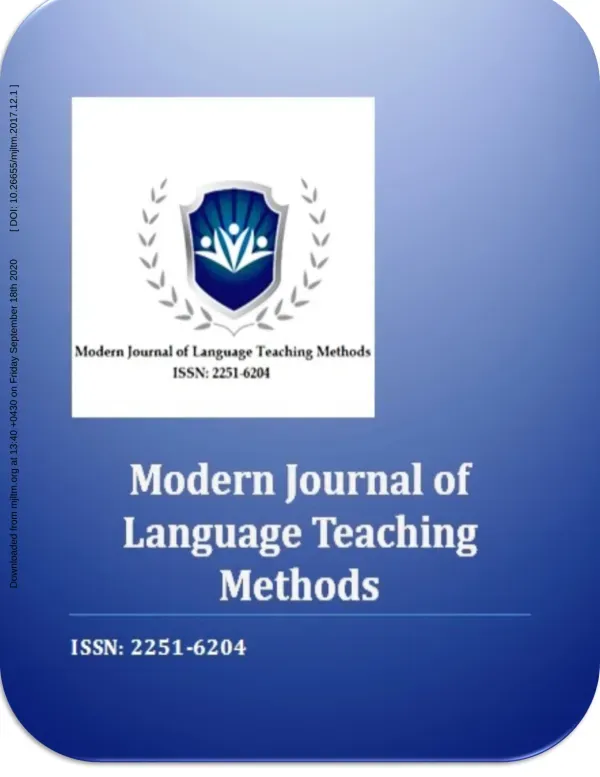
Modern Journal of Language Teaching Methods - December 2017 Edition
Document information
| Author | Fanuza H. Gabdrakhmanova |
| School | University of Pitesti |
| Major | Linguistics |
| Year of publication | 2017 |
| Company | Modern Journal of Language Teaching Methods |
| Place | Pitesti |
| Document type | journal |
| Language | English |
| Number of pages | 497 |
| Format | |
| Size | 7.78 MB |
- Language Teaching
- Linguistics
- Education
Summary
I. Overview of the Journal
The Modern Journal of Language Teaching Methods serves as a significant platform for scholars and educators in the field of language education. The December 2017 edition features a diverse range of articles that explore various aspects of language teaching methodologies. The journal is edited by Cristina Ungureanu, an Associate Professor at the University of Pitesti, ensuring a high standard of academic rigor. The editorial board comprises experts from various universities worldwide, reflecting a global perspective on language teaching. This edition emphasizes the importance of integrating cultural and linguistic elements in language education, which is crucial for developing effective teaching strategies. The journal's ISSN is 2251-6204, and it is indexed in several academic databases, enhancing its visibility and accessibility to researchers and practitioners alike.
II. Key Articles and Themes
The articles in this edition cover a wide array of topics, each contributing to the understanding of language teaching methods. For instance, the article titled 'Idioms As Expressive Means Of Linguistic Identity Of A Speaker' by Fanuza H. Gabdrakhmanova et al. delves into how idiomatic expressions shape linguistic identity. Another notable contribution is 'Difficulty In English Reading Texts Comprehension' by Anastasia A. Kuznetsova et al., which addresses challenges faced by learners in comprehending English texts. These articles highlight the salient keywords of linguistic identity, comprehension difficulties, and the role of cultural context in language learning. The diversity of topics underscores the multifaceted nature of language education and the need for innovative teaching approaches that cater to various learner needs.
III. Practical Applications of Research
The findings presented in the articles have significant implications for language educators. For example, the research on idioms can inform teaching practices by encouraging educators to incorporate culturally relevant materials that resonate with students' experiences. Similarly, insights from the comprehension difficulties article can guide the development of targeted interventions to support struggling readers. The emphasis on integrative skills in higher education, as discussed in the article by Nailia F. Plotnikova et al., suggests that educators should foster collaborative learning environments that enhance students' language proficiency. Overall, the practical applications of the research findings can lead to improved teaching methodologies and better learning outcomes for students in language education.
IV. Conclusion and Future Directions
The Modern Journal of Language Teaching Methods - December 2017 Edition not only presents valuable research but also sets the stage for future inquiries in language education. The journal encourages ongoing dialogue among educators and researchers, fostering a community dedicated to enhancing language teaching practices. Future editions may explore emerging trends in technology and language learning, as well as the impact of globalization on language education. The commitment to academic excellence and practical relevance positions the journal as a vital resource for those involved in language teaching and research. Continued exploration of the themes presented in this edition will contribute to the evolution of effective language teaching methodologies.
Document reference
- Idioms As Expressive Means Of Linguistic Identity Of A Speaker (On The Basis Of The Tatar and Kazakh Languages) (Fanuza H. Gabdrakhmanova, Radif R. Zamaletdinov, Raushaniya S. Nurmukhametova, Almira T. Tatkenova, Guldarkhan N. Smagulova)
- Difficulty In English Reading Texts Comprehension (Anastasia A. Kuznetsova, Lilia G. Ilyasova, Olga A. Bezuglova, Saida A. Arbarova)
- Linguistic Characteristics Of Tatar Tea-Drinking(On The Example Of Names Of Tableware And Meals) (Gulgena N. Khusnullina, Radif R. Zamaletdinov, Raushaniya S. Nurmukhametova, Gulnara F. Zamaletdinova, Madina R. Sattarova)
- Tatar Language Testing: Requirement, Structure And Assessment(Elementary Level) (Alsu Ashrapova, Аyrat Yusupov, Radif Zamaletdinov, Dilyara Shakirova)
- Mother Tongue: The Role It Plays In Teaching And Learning Foreign Languages (Iskander E. Yarmakeev, Tatiana S. Pimenova, Albina R. Abdrafikova, Oksana K. Nazarova)
